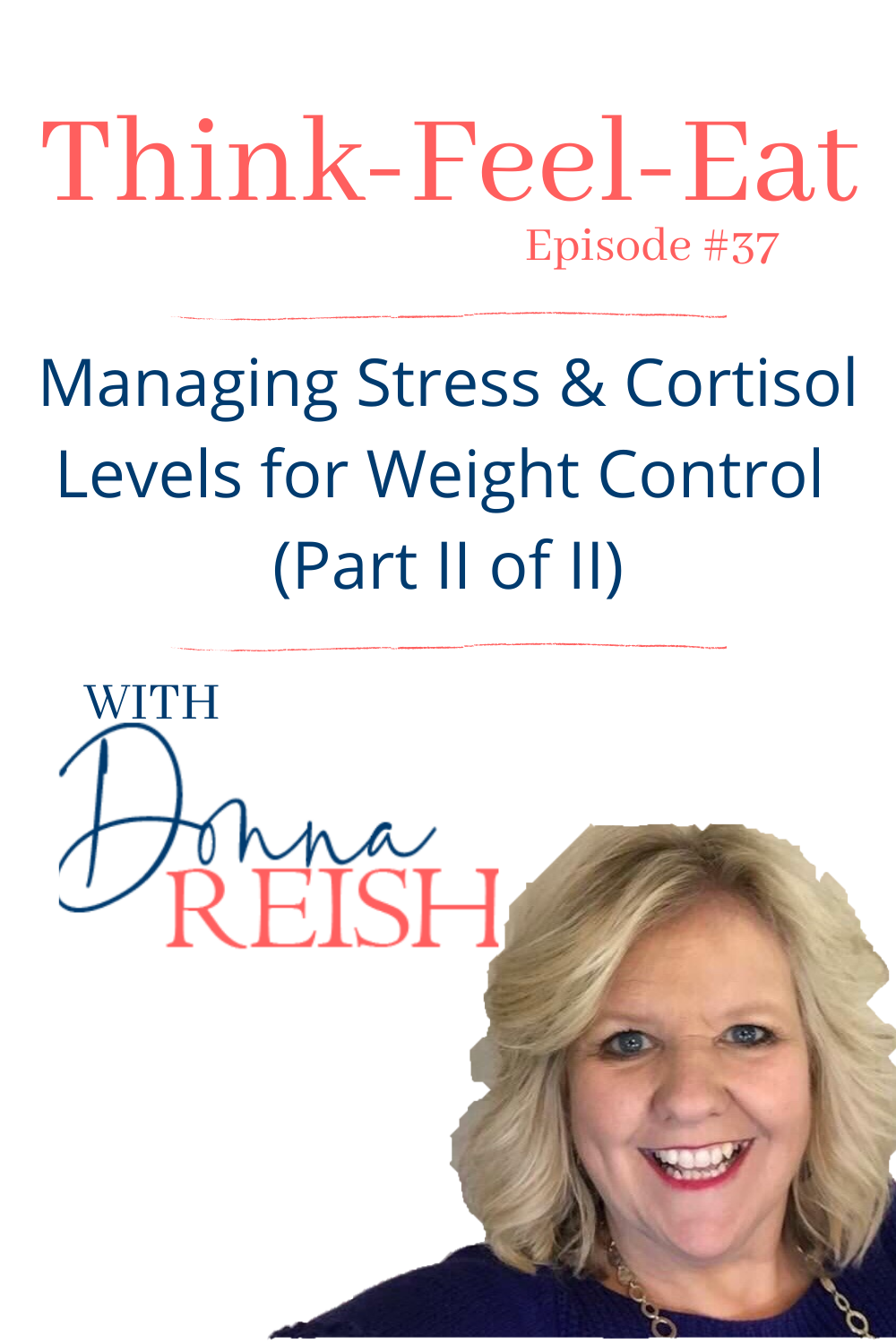Hi! I’m Donna Reish, IF teacher, weight loss coach, blogger, and half of “The Minus 220 Pound Pair” as my husband and I have lost over 220 pounds together (160 of that in the past couple of years through the Weight Loss Lifestyle habits and strategies I teach!).
In this episode, I present second part to Stress—this one offers some solutions!
(Check out Part I where I tell the effects of stress on weight, stomach fat, cravings, and more! Think-Feel-Eat #36!)
In this episode, I first review stress and cortisol and what happens in the body when cortisol is released too much/too often/too long due to stress. Then I move into the big picture look of stress and cortisol, including:
- Developing a life plan that helps you controls your stress (including looking down as an observer of your life, developing habits, building incrementality, convincing your brain that you are creating a stress plan, and more!)
- Understanding stress eating (what I call “Frenzied Food” in the 4 F’s of Food Types—Fuel Food, Fun Food, Frenzied Food, and Fog Food)
- Setting yourself up for food success with barriers, substitutions, and interrupting the stress eating pattern.
Then I move into specific practices that can help us control stress and excessive cortisol release, including sleep, mindfulness/meditation/breathing, exercise, yoga, laughter, nature, and music.
Find all of my episodes, outlines, and articles for my two weekly broadcasts:
(1) Weight Loss Lifestyle broadcast (formerly Donna’s Intermittent Fasting Broadcast)
Think Feel Eat Outline 37: Managing Stress & Cortisol Levels for Weight Control Part II of II
A. Stress and Cortisol Defined
1. Stress
a. Makes fat loss hard
b. Can be anything that threatens our safety, status, well being
c. Can be anything that initiates physical or psychological demands that are above our ability to handle them
d. Can be unpredictable change in environment
e. Can be an inconsistency between our expectations and actual outcomes
f. Can be real or perceived
g. Different for all people
h. Response based on our experiences with that stressor
i. When stress occurs, we have emotional responses
i. Feelings of uneasiness
ii. Impending doom
iii. Rumination/worr
iv. Desire to avoid the stress
j. When stress occurs, we have physiological responses
i. Body bloods with adrenaline and noradrenaline—fight/flight…for a few seconds
ii. When this happens, we respond/rise to the challenge
iii. This is why people are given adrenaline to wake them up, etc. when injured
iv. When we have a stress, we also release cortisol
2. Cortisol
a. Stress hormone that turns into neurotransmitter—turns into “steroids”
b. Slow acting but long lasting
c. Broken down in the body to give energy when needed
d. Helps recovery when emergency is over
e. Suppresses inflammation (i.e. cortisol shots and creams)
f. The stomach has four times the number of cortisol receptors as anyplace else—thus, the belly fat from chronic stress and high cortisol.
3. Stress and cortisol different nowadays than early man
a. Only had cortisol for short periods of time before
b. Now we get stressed frequently and have high cortisol for longer periods, sometimes chronically
4. Ari Whitten, Fat Loss Blueprint
a. Course I have recently taken
b. Learned a lot about stress, cortisol, and sleep from it
c. Many of the studies I refer to here were explained in that course
B. Big Picture Look at Your Stress and Cortisol
1. Not in the middle of your stress—not “during the conflict”
2. Develop a life plan that helps you control your stress
a. Look down as an observer of your life
b. Habits
c. Incrementality
d. A “stress prevention activities” plan
e. If brain thinks you have a plan to deal with stress, it believes you—even if your plan isn’t fully in place!
f. TFE 29 and 30 Over-hunger vs. Over-desire
3. Understand stress eating
a. “Frenzied” eating (TFE #15)
b. Brain becomes habituated to a heightened state of craving foods—this becomes a habit (if we created this habit before, we can create a new habit now!)
c. Set yourself up for food success
i. Food choices/dieting/resisting urges is a stress on top of the stress
ii. Too much restriction causes unnecessary stress
1. Research shows overweight people are more prone to stress eat
2. Research shows that those who overly-restrict are more prone to stress eating
3. Create barriers for these times
a. Barriers
b. Substitutions
c. Interrupt the stress eating pattern
i. Word you use
ii. Clap or tap
iii. Closing something
iv. 5 Second Rule
C. Sleep (Effects of Too Little Sleep on Weight —TFE #34)
1. Sleep loss makes us more emotionally reactive, impulsive, and prone to cognitive deficits that create more stress
2. Chronic stress makes sleeping difficult and worsens the quality of our sleep
3. Focusing on both sleep increasing and stress reduction will benefit both
4. Sleep can be enhanced
a. Morning sun exposure
b. Avoid artificial light at night
c. Sleeping in a cool environment
d. Using melatonin if needed
D. Mindfulness/Meditation/Breathing
1. Train yourself to think differently
a. Visiting WHY often (TFE #3)
b. Doing Thought Work (TFE #1)
2. One meditation session
a. Drops cortisol levels by 20% in a study of medical students
b. Lower cortisol levels correlate with length of time spent meditating
3. Train yourself to think differently through meditation—programs/apps, prayer, gratefulness practices, journaling
4. Breathing
a. Take ten deep breaths before you answer? True!
b. Some say equal inhale and exhale; some say twice as long on exhale as inhale
E. Exercise
1. Exercise is a stress in itself
a. Choose HIIT (fast cortisol recovery), strength training, yoga, walking—if it feels crazy stressful, it probably is!
b. Choose according to how you feel
c. Exercise helps relieve pent up stress
2. Walking
a. Outdoors known for reducing cortisol (and also increasing groundedness)
b. Walking lowers cortisol by up to 18%
i. It is a beneath the surface type of activity so doesn’t cause a compensatory mechanism (making up for high intensity exercise by sitting too much and eventually reducing NEAT (non exercise activity thermogenesis)
ii. Women are more susceptible to compensatory mechanism
iii. Walking doesn’t cause this compensation because it doesn’t send negative signal to the brain since the calorie burning is slower (not losing calories at such a high rate so body doesn’t sense that calories are being burned)
3. Yoga
a. Great way to cope with stress, burnout, and high cortisol
b. Known to reduce perceived stress, anxiety, cortisol levels
F. Other
1. Laughter
a. Considered lifestyle medicine
b. Used for those receiving treatments for cancer, Parkinsons, and more
c. Increases production of endorphins in brain, which leads to a variety of benefits including improved mood and greater life satisfaction
d. Reduces cortisol and stress
e. “Laughter and tears: best medicine for stress.”
2. Nature
3. Music
a. Research shows before and after stressful even—lowers cortisol
b. Relaxing music best
G. Get More Help!
1. Join our holiday weight loss challenge
2. Join my FREE FB group where I record videocast/podcast episodes!
3. Emails with teaching around weight management—articles, videos, free charts and booklets, and more
4. Take my month-long Intermittent Fasting course













